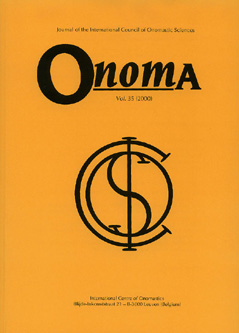 previous article in this issue previous article in this issue | next article in this issue  |

Preview first page |
Document Details : Title: Literarische Onomastik in Deutschland, mit einem Beispiel aus der Übersetzungspraxis Author(s): KRÜGER, Dietlind Journal: Onoma Volume: 40 Date: 2005 Pages: 293-317 DOI: 10.2143/ONO.40.0.2033083 Abstract : The study of names in literature has established itself quite well in Germany although as it emphasizes “literary onomastics” more and the “onomastics of literary theory” less (Nicolaisen 2004: 247). Beginning in the shadows with only unsystematic observations of selected names of selected writers, it has, by means of numerous empirical studies in recent decades, been able to develop theoretically and methodically into a well-established sub-discipline of name study. As more questions are raised about the literary translation of names, literary onomastics achieves even greater importance. It needs to make itself surely better known as a discipline that is useful in a practical way to the science of translation. L’onomastique littéraire est bien établie en Allemagne, même si l’on suivra volontiers Wilhelm Nicolaisen (2004: 247) en constatant qu’il s’agit plutôt d’une approche onomastique du nom littéraire que d’une analyse littéraire focalisée sur le nom propre. Grâce aux nombreuses études à caractère empirique menées durant les dernières décennies, cette branche de l’onomastique a pu se doter d’une base théorique et méthodologique très solide qui lui a permis de sortir de l’ombre dans laquelle les observations antérieures, très ponctuelles, sur tel ou tel nom particulier employé par un auteur donné l’avaient antérieurement plongée. Par ailleurs, cette discipline a récemment pris de l’ampleur en reliant ses champs d’investigation au problème de la traduction des noms propres; ces nouvelles approches et leur mise en pratique par la traductologie gagneraient à être mieux connues. Die literarische Namenforschung hat sich in Deutschland gut etablieren können, wiewohl sie auch hier eine „literarische Onomastik“ und weniger eine „onomastische Literaturwissenschaft“ (Nicolaisen 2004: 247) ist. Sie hat sich durch zahlreiche empirische Untersuchungen in den letzten Jahrzehnten aus dem Schattendasein einer zunächst nur unsystematischen Betrachtung ausgewählter Namen bei ausgewählten Schriftstellern zu einer theoretisch und methodisch gut etablierten Teildisziplin der Namenforschung entwickeln können. Mit der Ausweitung der Fragestellung auf die Übersetzung literarischer Namen gewinnt die literarische Onomastik weiter an Bedeutung. Sie muss sich als praxisrelevante Disziplin in der Übersetzungswissenschaft aber noch bekannter machen. |
|


